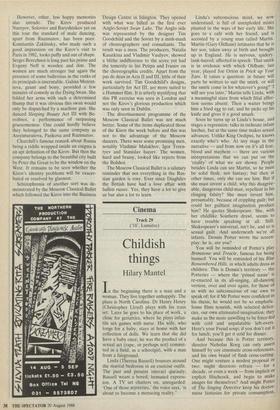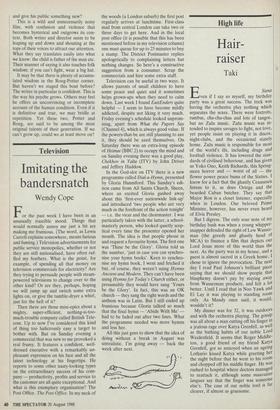Cinema
Track 29 ('18', Lumiere)
Childish things
Hilary Mantel
In the beginning there is a man and a woman. They live together unhappily. The place is North Carolina. Dr Henry Henry (Christopher Lloyd) plays with his train set. Later he goes to his place of work, a clinic for geriatrics, where he plays infan- tile sex games with nurse. His wife, who longs for a baby, stays at home with her collection of dolls. We learn that she did have a baby once; he was the product of a sexual act (rape, or perhaps not) commit- ted in a field, as a schoolgirl, with a man from a fairground.
Linda (Theresa Russell) bounces around the marital bedroom in an exercise outfit. The past and present interact queasily; Russell wears a bored, bemused express- ion. A TV set chatters on, unregarded: 'One of those mysteries,' the voice says, 'is about to become a menacing reality.' Linda's subconscious mind, we now understand, is full of unexploded mines planted in the wars of her early life. She goes to a cafe with her friend, and is accosted by a young man called Martin. Martin (Gary Oldham) intimates that he is her son, taken away at birth and brought up in England. He is nervous, spidery, lank-haired, affected in speech. That smirk is in evidence with which Oldham, last year, played Joe Orton in Prick up Your Ears. It raises a question: in future will parts be written to suit the smirk, or will the smirk come in for whatever's going? 'I will see you later,' Martin tells Linda, with a meaningful stare from which filial affec- tion seems absent. Then a waiter brings him a fried egg to eat, and he picks up his knife and gives it a good smash. Soon he turns up at Linda's house, and stages a regression: talks in inchoate infant lurches, but at the same time makes sexual advances. Unlike King Oedipus, he knows exactly who's who. At any stage in the narrative — and from now on it's all fear, blood and mayhem — there are various interpretations that we can put on the `reality' of what we are shown. People besides Linda can see Martin, so he must be solid flesh, not fantasy; but then at other times, only she can see him. But if she must invent a child, why this disagree- able, dangerous child-man, repellent in his clinging falsity? She must invent him, presumably, because of crippling guilt; but could her guiltiest imagination produce him? He quotes Shakespeare. She, with her childlike Southern drawl, seems to have trouble speaking at all. Still, Shakespeare's universal, isn't he, and so is sexual guilt. And underneath we're all infants. Dennis Potter wrote the screen- play: he is, are you?
You will be reminded of Potter's play Brimstone and Treacle, famous for being banned. You will be reminded of his Blue Remembered Hills, in which adults dress as children. This is Dennis's territory — the Potteries — where the 'primal scene' is re-enacted in its all-singing, all-dancing version, over and over again, for those of us with no subconscious of our own to speak of; for if Mr Potter were confident in his thesis, he would not be so emphatic. Some films nourish, with selected delica- cies, our own attenuated imagination: they make us the more unwilling to be force-fed with cold and unpalatable left-overs. Here's your Freud soup; if you don't eat it for lunch, you'll get it cold for dinner.
And because this is Potter territory, director Nicholas Roeg can only assert himself by coy cinematic cross-references, and his own brand of flash cross-cutting. One might venture a modest proposal or two: might directors refrain — for a decade, or even a week — from implicit or explicit Hitchcock, and begin to make images for themselves? And might Potter of The Singing Detective keep his doctor- nurse fantasies for private consumption,
and give his public something new?
This is a wild and unnecessarily noisy film, with confusion and violence that becomes hysterical and outgrows its con- text. Both writer and director seem to be leaping up and down and shouting at the tops of their voices to attract our attention. What they say translates easily into what we know: the child is father of the man etc. Their manner of saying it also touches folk wisdom: if you can't fight, wear a big hat.
It may be that there is plenty of accumu- lated wisdom in the Roeg-Potter corner. But haven't we staged this bout before? The writer in particular is confident. This is the way his psyche grows. Others may feel he offers an unconvincing or incomplete account of the human condition. Even if it is definitive and true, we may bridle at repetition. Yet these two, Potter and Roeg, are said to be among the most original talents of their generation. If we can't grow up, could we at least move on?























































 Previous page
Previous page